In today’s complex socio-economic setting, with companies’ actions under constant scrutiny, consumer trust is emerging as a critical competitive factor – not only for a company’s success, but to guarantee its very survival.
To identify the key factors that determine consumers’ trust in companies, this study examines six relevant business industries: Food and Beverage, Automotive, Cosmetics, Pharmaceutical, Textile and Telecommunications. It looks at the most important aspects affecting the trust Spanish consumers place in companies, encompassing them within three main areas (“drivers”) of LLORENTE & CUENCA’s reputation model:
• Credibility: associated with practical expectations, this concept represents the fulfillment of a promise, perceived usefulness and expected results. It incorporates aspects that revolve around the product/service and its features (tests and trials, components/ingredients, customer service, etc.).
• Transparency: connected to communication and relational expectations, this concept refers to the company’s openness and communication strategies. It encompasses aspects regarding communications and marketing (consumer information, access to the company, advertising and publicity, etc.).
• Integrity: associated with consumers’ ethical expectations, this concept represents the evaluation of a company’s behavior with regards to ethics and honesty. It deals with attributes connected to good business practices in different areas (environment, employment, supply chain, etc.).
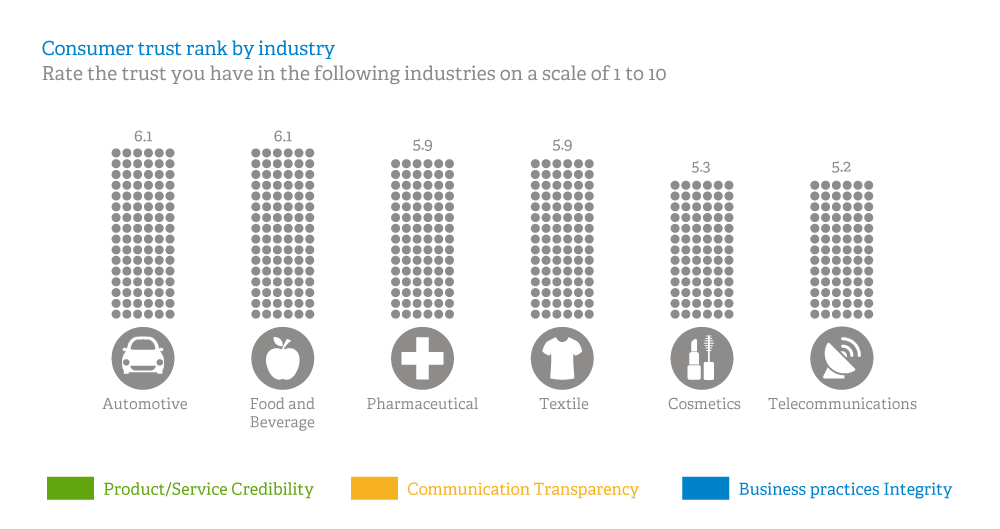
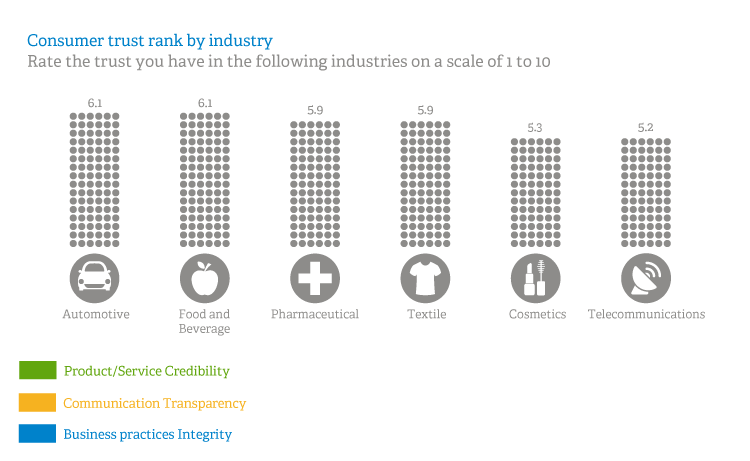
Main Findings
A preliminary assessment of the study shows that none of the analyzed industries enjoy a solid, trusting relationship with Spanish consumers. On a scale of 1 to 10, the surveyed consumers rank the Automotive and Food and Beverage industries the highest in terms of the trust they elicit, with an overall grade of 6.1. On the opposite end are the Telecommunications (5.2 points) and Cosmetics (5.3 points) industries, which inspire the least amount of trust. Furthermore, a comparative analysis of consumer trust in these 6 industries displays the fact that their priorities change in each case. On the one hand, we can clearly identify four sectors in which confidence largely depends on the credibility of the product or service: Food/Beverage, Automotive, Pharmaceutical and Cosmetics. In contrast, integrity and transparency gain increased importance in the Telecommunications and Textile sectors. When we focus on the specific factors, it becomes clear that some are extremely relevant and applicable to all industries, mainly the following three: tests and trials carried out on the product, detailed information (the small print) regarding the product or service, and the company’s behavior with regards to regulations and the law. Additionally, the study identifies certain aspects that are starting to have greater impact on consumer trust and to which younger consumers (especially those aged 18 to 34) grant significant importance. They are qualities concerning environmental impact, animal cruelty, effect on health, honesty in advertising and working conditions for employees.
FOOD AND BEVERAGE
Due to its large impact and frequent usage, the Food and Beverage industry is one of the sectors that has undergone the greatest public scrutiny in recent years and bears the brunt of a large portion of the “trust gap” felt by consumers today.
Most of the factors that appear in the “top 10” of consumer concerns refer to credibility (determining 60% of consumers’ overall trust). This means that they represent issues specifically concerning the product or service. Quality control tests and impact on health are at the top of the list, with women and young consumers prioritizing the latter. Knowledge regarding the product’s ingredients/ components, the origin of
the raw materials and the organoleptic characteristics are also relevant within this sphere. At the bottom, a new trust factor makes its way onto the list: that the product not come from an animal treated with antibiotics.
With regards to the integrity indicators (which amount to 23.6% of consumer trust in the F&B industry), the study highlights the importance consumers give to operating within the law, especially men. Meanwhile, the responsible treatment of animals and the environment make an appearance on the top 10 list, an issue that is especially relevant to a younger sector of the population.
Transparency is also important, especially the need for detailed product information (something that is particularly important to men). When we look more closely at this category, we notice that truthful advertising and easy access to company information also occupy prominent positions.
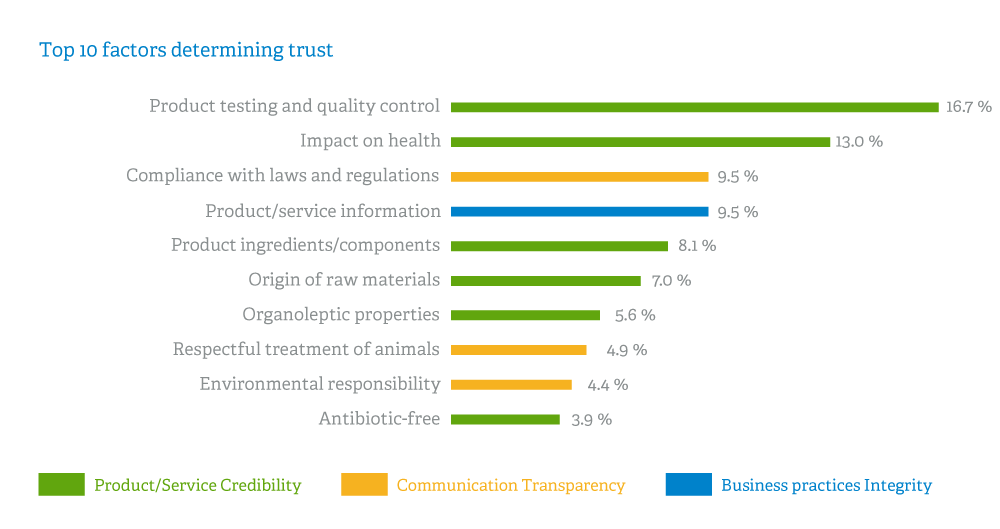
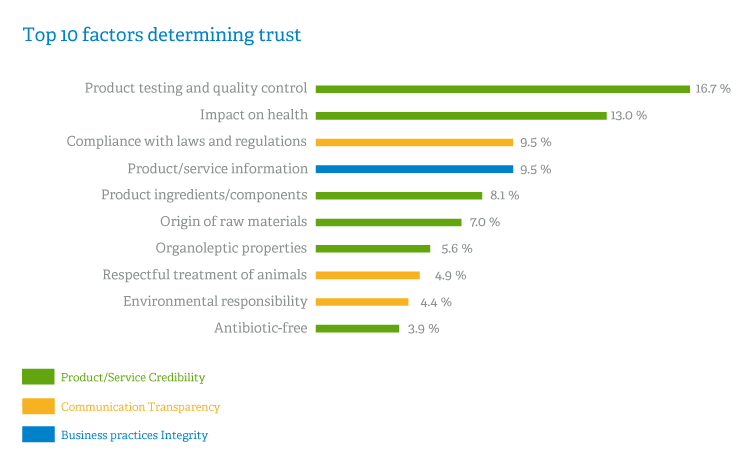
AUTOMATIVE
The Automotive sector is another industry under heightened public scrutiny after several scandals involving trust, palpable in the results of the study.
The most important factor to consumers, set far apart from the rest, refers to credibility: undergoing tests that ensure the quality of the final product. However, following it in the rankings are two factors concerned with integrity: that the company be environmentally responsible and that it operates within the framework of the law – factors that allude directly to the well-known reputation scandals that have befallen the industry, especially important to young consumers.
If we compare the two sexes, we notice that when it comes to trusting an automotive company, women grant more importance to aspects concerning integrity, while men focus more on factors pertaining to credibility. Otherprominent credibility factors are customer service, impact on health and the product’s ingredients/components.
Towards the middle of the list are transparency factors like detailed information on the product and truthful advertising. Additionally, when asked explicitly about transparency, consumers also mention the importance of easy contact with the company, something that is especially valued by older consumers.
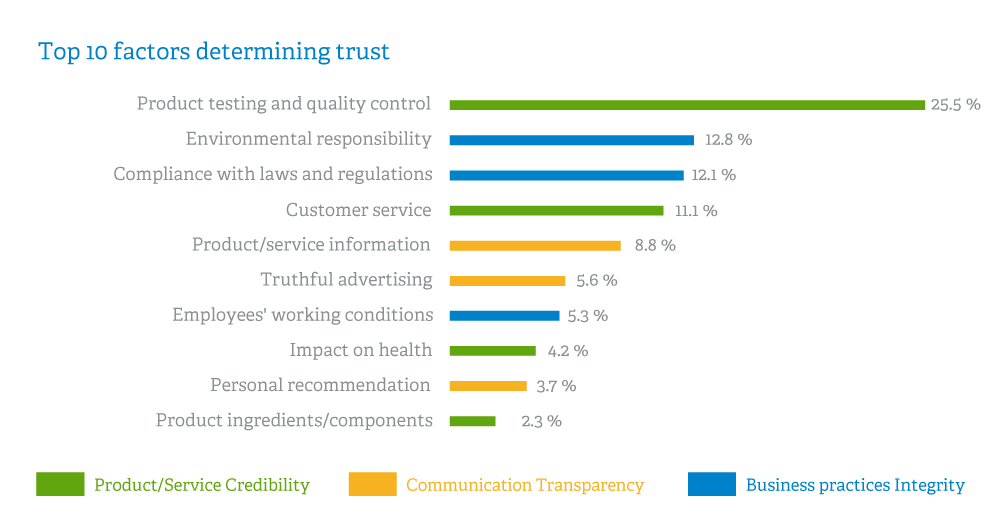
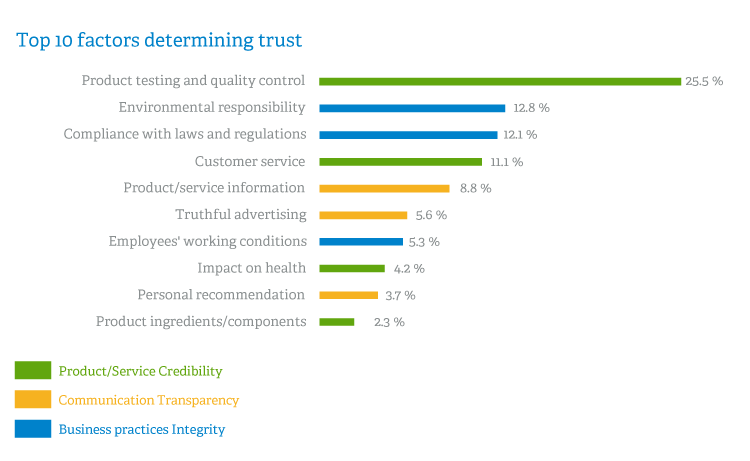
COSMETICS
Product effectiveness (weighing in at 17.2%) and that the product has undergone different tests and trials (15.3%) are at the top of the trust index when consumers are surveyed about the Cosmetics industry. Older consumers are the ones who most prioritize these factors, and, while men prioritize tests and trials, women focus more on effectiveness (despite also citing testing as an extremely important trust factor). These aspects, both of which are encompassed within the scope of product credibility, are joined by others, such as impact on health or the origin of the raw materials, at the tail end of the list.
The study emphasizes the importance consumers give to the ethical treatment of animals, weighing in at 11.1%. This factor concerns integrity, as do others on the list, like respecting legality and environmental responsibility. This concern for animal welfare in the Cosmetics industry is especially significant among women and young consumers, deeming it as an extremely important element for building trust within the sector. With regard to the company’s communications policy, and therefore the scope of transparency, the surveyed consumers highlight the importance of detailed information on the product – and close behind, the availability of information regarding the clinical trials, as well as truthful advertising.
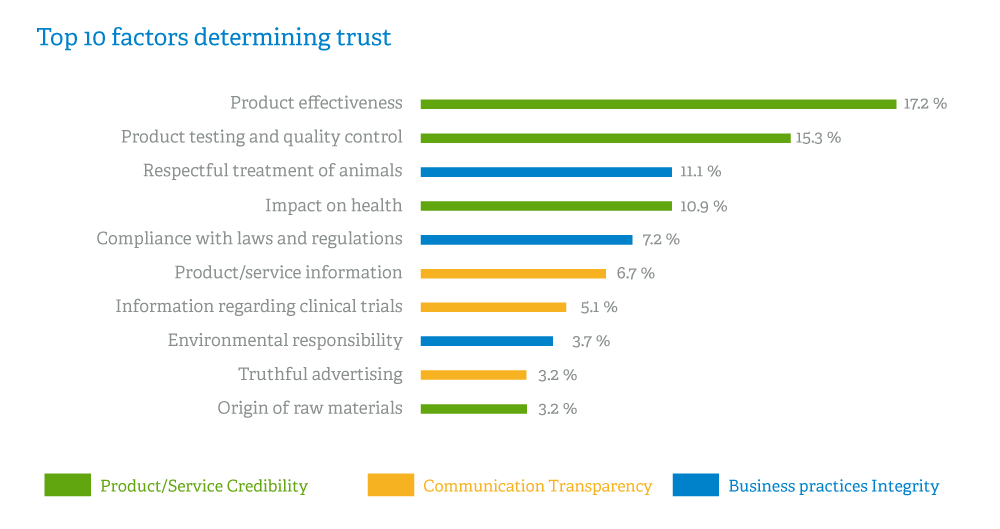
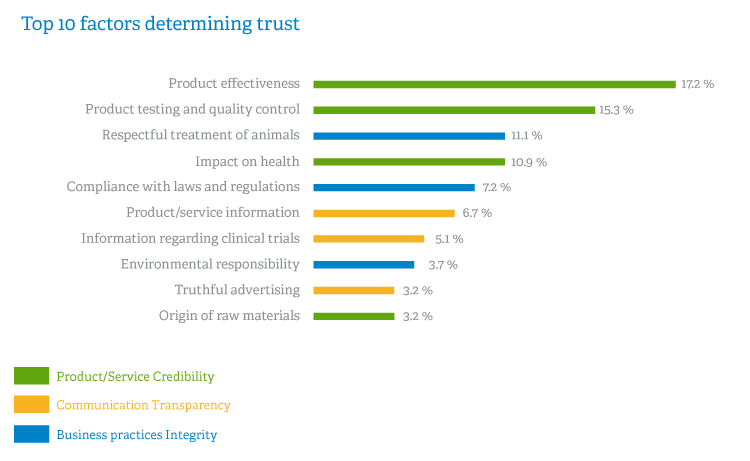
PHARMACEUTICAL
Factors associated with product credibility are key in the Pharmaceutical sector, where product effectiveness, its impact on health and tests and trials dominate the ranking.
The study shows that while most women prioritize effectiveness, men emphasize the importance of the tests performed on the products. Transparency makes an appearance in the form of detailed product information and, to a lesser degree, knowledge regarding the clinical trials required to launch the product.
Spanish consumers also grant importance to corporate governance, such as operating within the law, responsible animal treatment (especially among young consumers and women) – and to a somewhat lesser degree – the working conditions of employees. All these factors determine consumers’ trust in companies operating in the Pharmaceutical sector.
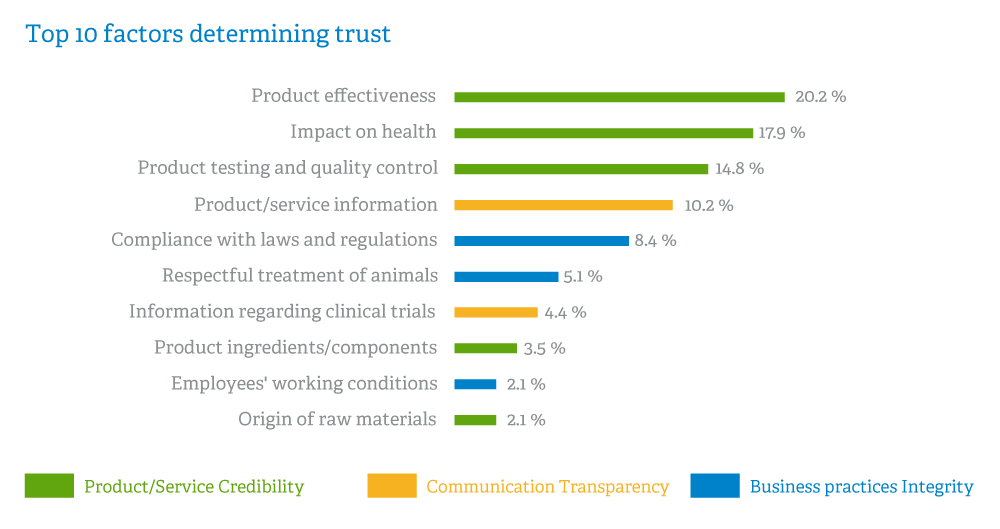
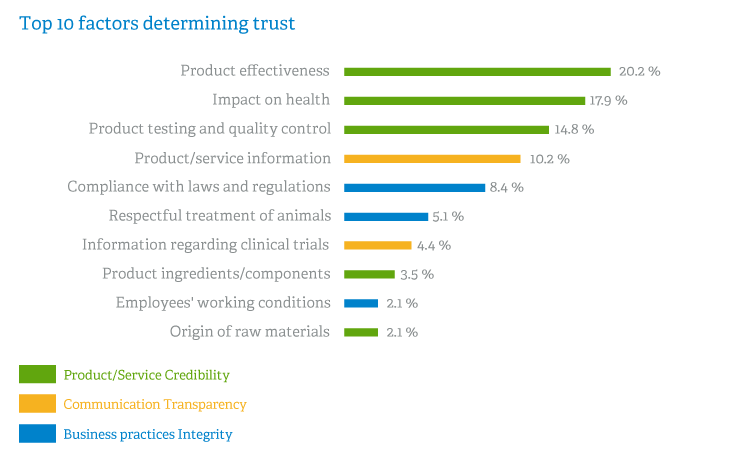
TELECOMMUNICATIONS
Consumer trust in the Telecommunications industry in Spain is markedly different than other sectors analyzed.
Ranked in first place is a credibility factor: good customer service (especially important to men), trailed by other credibility factors like tests and health impact.
In second place overall is the company’s lawful behavior, a key factor for most consumers. Other aspects related to integrity – such as the privacy policy and responsible use of personal information (7.2%), environmental responsibility (3.5%) and employment conditions for their workers (3.5%) – are also valued highly by consumers.
Factors associated with transparency are higher up on the list in this industry as compared with others, with detailed product/service information in the third overall position; and in fifth and sixth place, respectively, truthful advertising and how easy it is to contact the company.
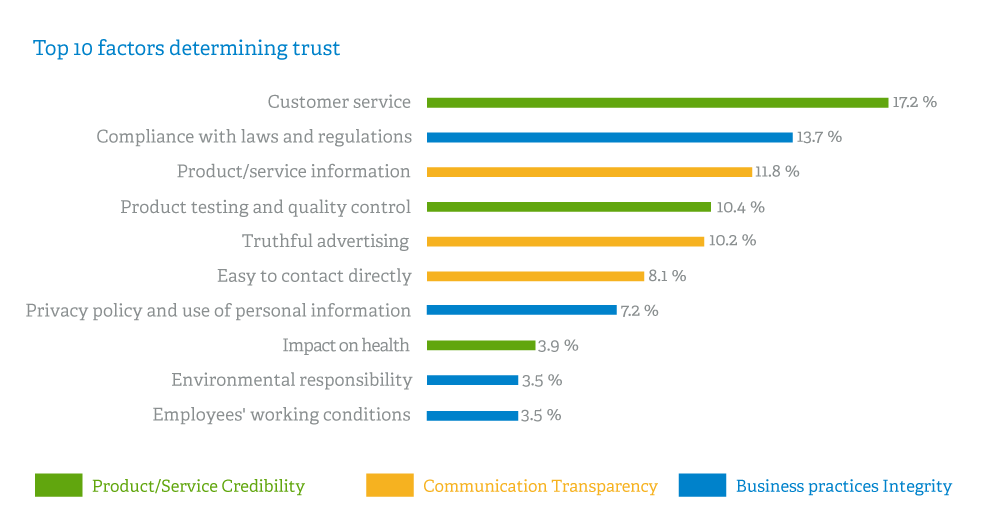
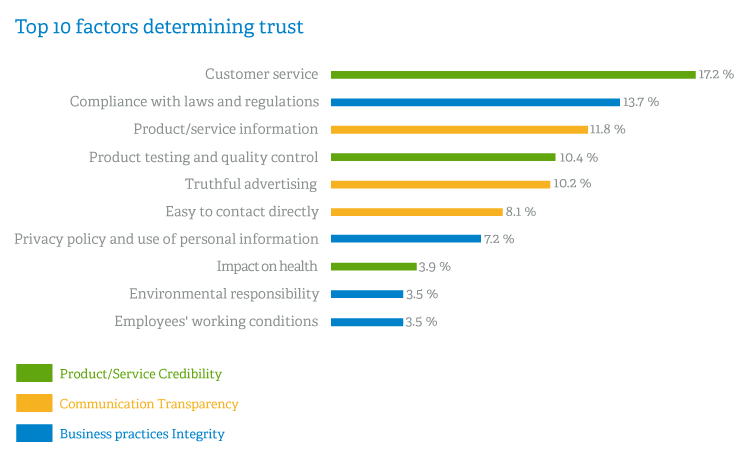
TEXTILE
Transparency is especially important in this industry, occupying first place on the ranking by way of detailed product information. However, factors associated with integrity carry the most overall weight when establishing trust with a consumer.
Working conditions climb the list to the second position (11.8%) due to the importance granted particularly by women and young consumers (18 to 34 years old), exceeding other integrity issues like operating within the law (11.1%, especially important to men), environmental responsibility (8.6%) or the humane treatment of animals (4.6%). While the trust generated in older consumers stems from a combination of all three reputation spheres, young consumers are mainly motivated by a company’s integrity, emphasizing not only the working conditions of employees, but also respect for the environment.
Among the credibility indicators, consumers state quality control, customer service and raw materials as the main trust drivers in the sector.
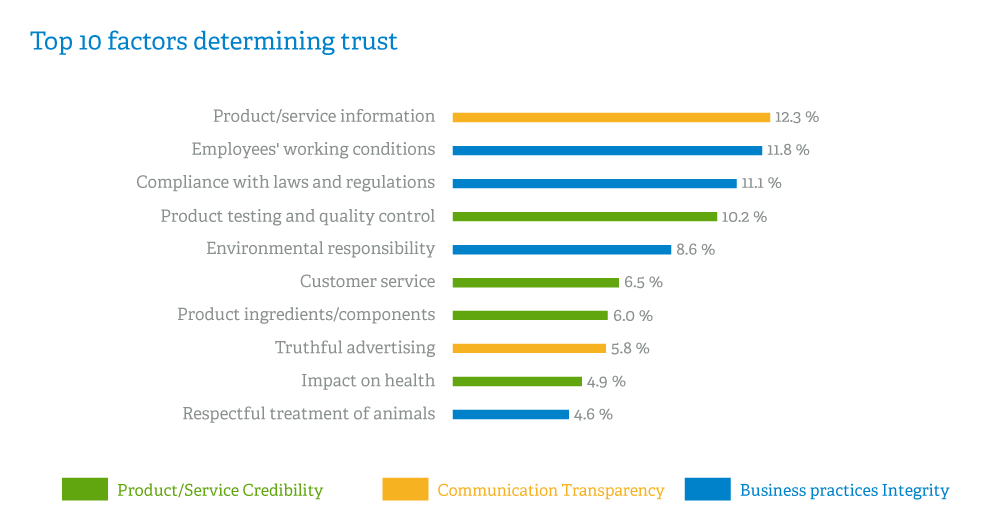
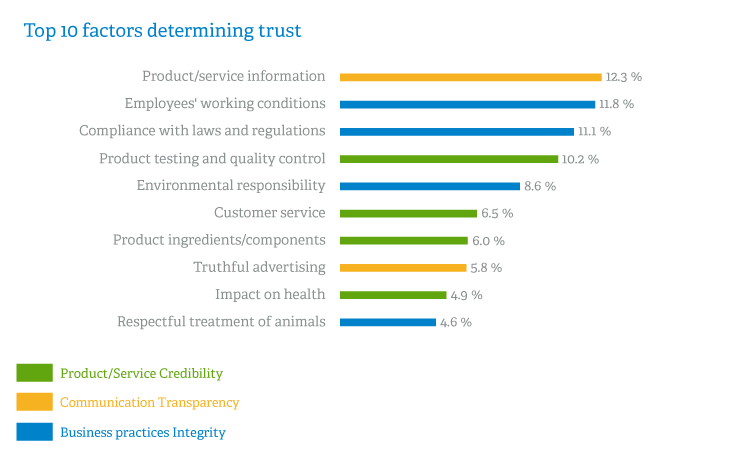
Authors
Juan Cardona
Jorge Tolsá




